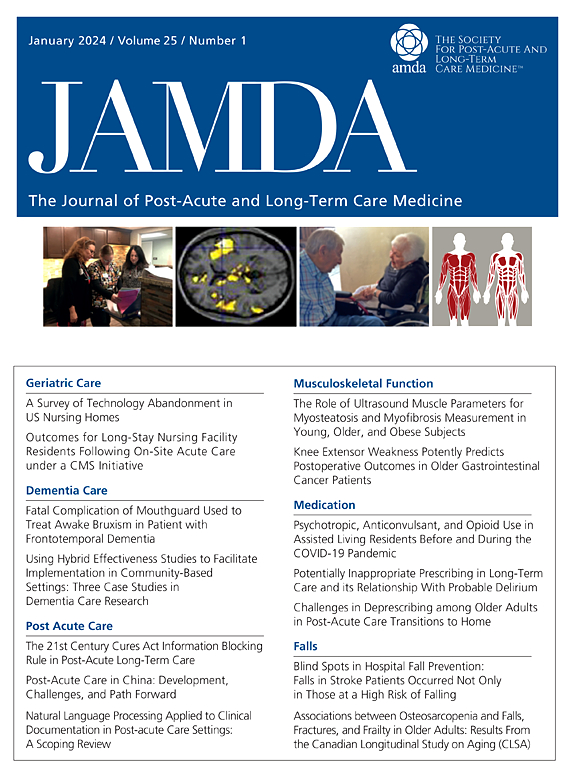社会支持对照顾者因配偶功能障碍而导致的功能障碍的影响。
IF 3.8
2区 医学
Q2 GERIATRICS & GERONTOLOGY
Journal of the American Medical Directors Association
Pub Date : 2024-10-23
DOI:10.1016/j.jamda.2024.105324
引用次数: 0
摘要
目的:研究社会支持对照顾者因配偶功能障碍而导致功能障碍的风险的影响:研究社会支持对配偶功能性残疾导致照顾者功能性残疾风险的影响:环境和参与者在这项使用大崎队列 2006 年研究数据的队列研究中,基线调查于 2006 年 12 月 1 日至 2006 年 12 月 15 日进行,共纳入 7598 名年龄≥65 岁的老年人,其中包括 3799 对夫妇:配偶功能性残疾的发生率以长期护理保险认证为准,该认证采用全国统一的功能性残疾标准。主要结果是照顾者的功能性残疾发生率,随访期为 2006 年 12 月 16 日至 2019 年 11 月 30 日。五份社会支持问卷用于评估每位参与者可获得的情感和工具性社会支持程度。采用 Cox 比例危险模型评估配偶功能障碍发生后照顾者的功能障碍发生率。此外,还根据情感和工具性社会支持的状况进行了分组分析:结果:与配偶无功能障碍的照顾者相比,配偶有功能障碍的照顾者的功能障碍显著增加(多变量危险比 [HR],1.86)。情感支持和工具性社会支持在这一关联中显示出显著的正交互作用(情感支持和工具性支持:无社会支持者比有社会支持者的照顾者残疾风险更高(有情感支持:HR,1.84;无情感支持:HR,1.84):HR, 1.84; without emotional support:HR,2.51;有工具支持:HR,1.85;无工具支持:HR,2.51):有工具支持:HR,1.85;无工具支持:HR,2.31):结论和影响:结论与启示:社会支持可能有助于缓解因配偶功能性残疾而增加的照顾者功能性残疾风险。本文章由计算机程序翻译,如有差异,请以英文原文为准。
Effect of Social Support on Caregiver's Functional Disability Due to Spouse's Functional Disability
Objectives
To examine the effect of social support on the risk of caregiver's functional disability due to spouse's functional disability.
Design
Longitudinal study.
Setting and Participants
In this cohort study using the Ohsaki Cohort 2006 Study data, the baseline survey was conducted from December 1, 2006, to December 15, 2006, and included 7598 older adults, including 3799 couples, ≥65 years of age.
Methods
The incidence of spouse's functional disability was defined as certification for the Long-term Care Insurance, which uses a nationally uniform standard of functional disability. The primary outcome was the incidence of the caregiver's functional disability, and the follow-up period was between December 16, 2006, and November 30, 2019. Five social support questionnaires were used to assess the degree of emotional and instrumental social support available to each participant. The Cox proportional hazards model was used to evaluate the incidence of functional disability among caregivers after the occurrence of spouses' functional disability. Subgroup analyses were also conducted according to the status of emotional and instrumental social support.
Results
The caregiver's functional disability increased significantly among those whose spouses had functional disability compared with those whose spouses had no disability [multivariate hazard ratio (HR), 1.86]. Emotional and instrumental social support showed significant positive interactions on this association (emotional and instrumental support: P for interaction < .01 and < .01, respectively), and the risk of caregiver's disability was higher among those without social support than among those with social support (with emotional support: HR, 1.84; without emotional support: HR, 2.51; with instrumental support: HR, 1.85; without instrumental support: HR, 2.31).
Conclusions and Implications
Social support may help to alleviate the increased risk for caregiver's functional disability due to the spouse's functional disability.
求助全文
通过发布文献求助,成功后即可免费获取论文全文。
去求助
来源期刊
CiteScore
11.10
自引率
6.60%
发文量
472
审稿时长
44 days
期刊介绍:
JAMDA, the official journal of AMDA - The Society for Post-Acute and Long-Term Care Medicine, is a leading peer-reviewed publication that offers practical information and research geared towards healthcare professionals in the post-acute and long-term care fields. It is also a valuable resource for policy-makers, organizational leaders, educators, and advocates.
The journal provides essential information for various healthcare professionals such as medical directors, attending physicians, nurses, consultant pharmacists, geriatric psychiatrists, nurse practitioners, physician assistants, physical and occupational therapists, social workers, and others involved in providing, overseeing, and promoting quality

 求助内容:
求助内容: 应助结果提醒方式:
应助结果提醒方式:


